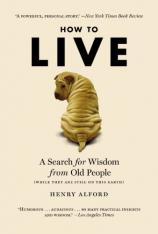Reading Group Guide
Discussion Questions
How to Live: A Search for Wisdom from Old People (While They Are Still on This Earth)

1. Alford cites five components of wisdom --- reciprocity, doubt, non-attachment, discretion, and working for the social good. Which do you think is most important, and why? Least important? Would you add anything to the list?
2. Alford cites research that suggests that, as we age, we get better at “pattern recognition.” Do you think this is true? If so, does seeing these patterns make a difference in our lives, or do we tend to make the same mistakes over and over?
3. What’s the best advice an older person has given you?
4. Very few of the people Alford interviewed expressed regrets. Why might this be?
5. Many readers think that the wisest person in the book is Althea Washington, who lost her husband and home in Hurricane Katrina. Do you have to suffer to be wise?
6. As an author, Alford does not comment on the scenes involving his mother. He’s said in interviews that this “you-are-there, fly-on-the-wall” type of storytelling is more akin to how wisdom actually works, because wisdom is often a “you had to be there” kind of experience. Do you agree? Is wisdom more powerful when it’s unspoken?
7. If you are 80 years old in 2010, that means that you were in your forties during the 1970s, when feminism was in full flower. Is it possible that some of the women and their stories in the book (e.g., Alford’s mother and her divorce, Granny D. and her walk across the country) are experiencing a late-in-life feminism? Do you agree or disagree with Alford’s assertion that old age is often more challenging for men than for women?
8. Alford writes that he didn’t include his interview of Ted Bensen, who asked Alford twice for money. Why does this strike Alford as “unwise”?
9. Alford suggests that the retired aerospace engineer Eugene Loh eats food out of the garbage and pees on his lawn not because it’s ecologically sound to do so but because Loh enjoys doing these things. Do you find Loh’s behavior wise or simply eccentric? Is it sometimes difficult to tell the difference?
10. Alford starts to view death differently after he spends some time looking at a book of post-mortem photography. What do you think of the practice of photographing --- and then displaying the photos --- of the dead? Granny D. says that, “Until you see face death and see its beauty, you will be afraid to really live.” Do you agree?
11. What kind of an older person does “How to Live” make you want to be? Are there any habits or tendencies that you now hope to diminish or build on?
How to Live: A Search for Wisdom from Old People (While They Are Still on This Earth)
- Publication Date: January 5, 2010
- Paperback: 288 pages
- Publisher: Twelve
- ISBN-10: 0446196045
- ISBN-13: 9780446196048








